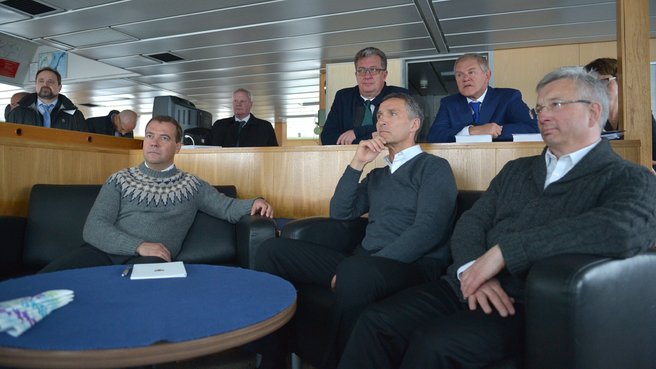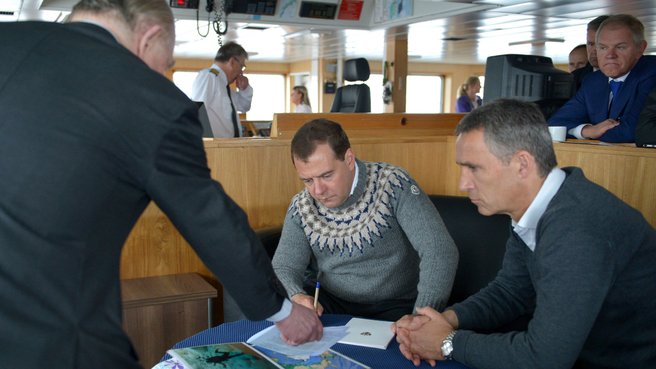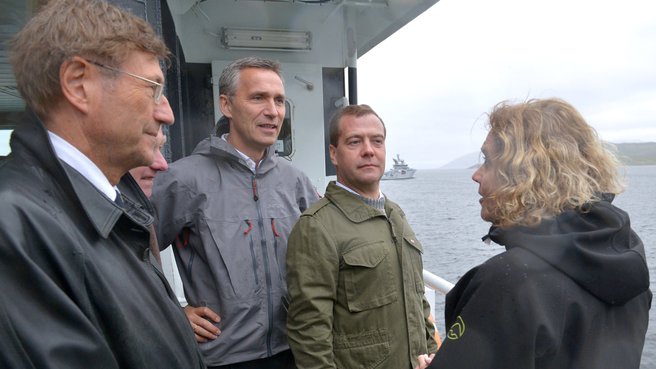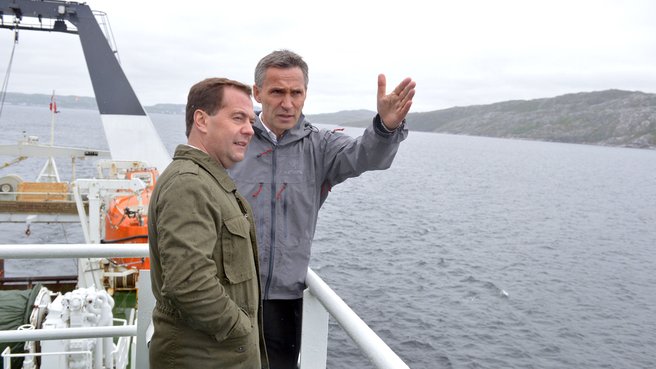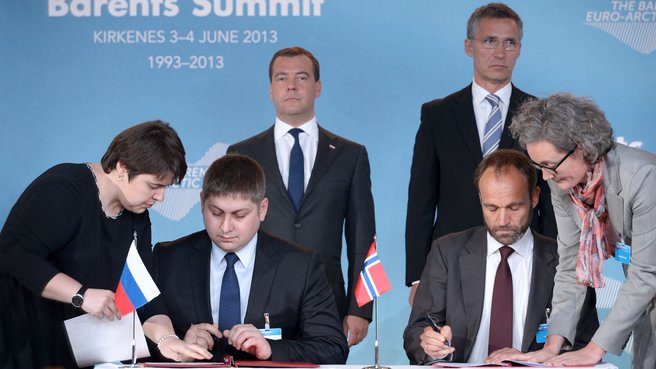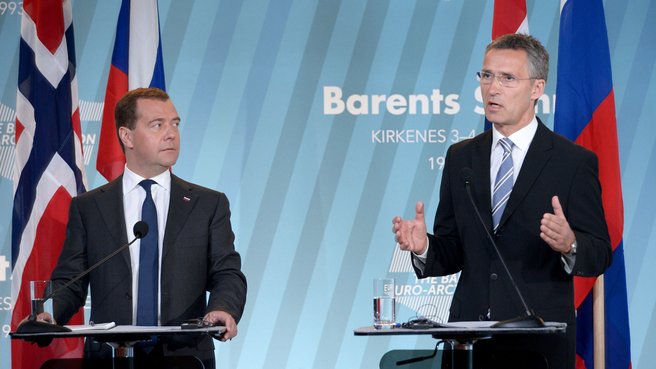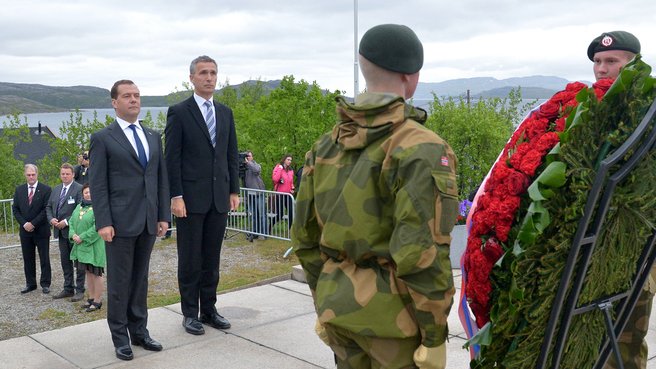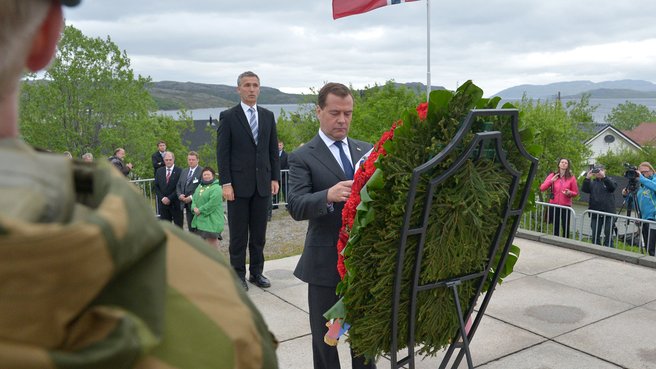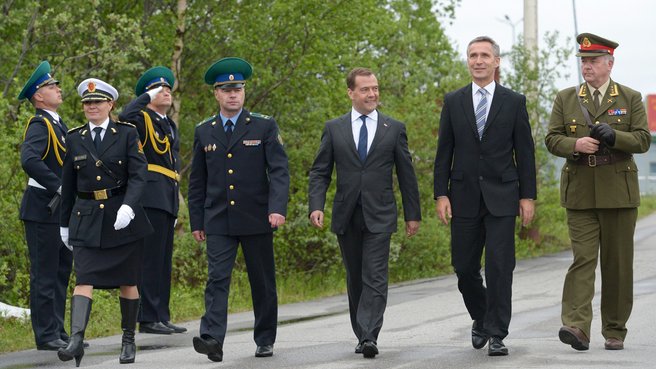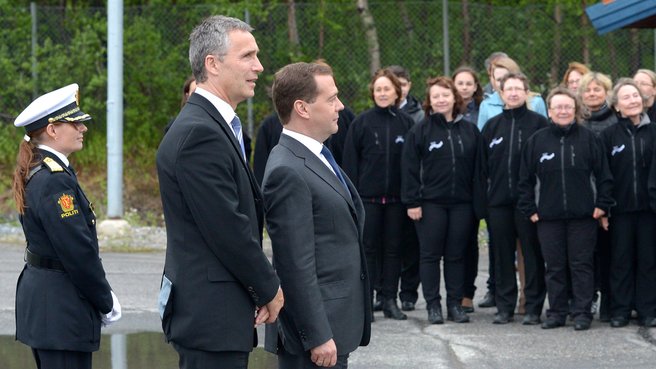Features:
- A boat trip around Bøkfjorden
- Talks with Norwegian Prime Minister Jens Stoltenberg
- Joint news conference
- Laying wreaths at the memorial to Soviet liberators
- Symbolic ceremony of crossing the Russian-Norwegian border
Working visit to Norway – Dmitry Medvedev and Jens Stoltenberg take a boat trip around Bøkfjorden
The prime ministers of Russia and Norway took a short trip around Bøkfjorden on board the Helmer Hanssen research vessel. They watched sea rescue drills.
During the trip, Norwegian Polar Institute Director Jan-Gunnar Winther told Dmitry Medvedev and Jens Stoltenberg about the state of the ice and climate in the Arctic.
Upon reaching a site where an exercise was being conducted, the prime ministers of Russia and Norway watched Norway’s Kystvakt Coast Guard vessel, assisted by a helicopter, rescue a person simulating drowning.
***
Talks with Norwegian Prime Minister Jens Stoltenberg
Two documents were signed following the talks:
-An agreement between the Federal Agency for the Development of State Border Infrastructure and the Ministry of Justice and Emergency Planning of Norway on cooperation and exchange of information in the functioning and development of state border checkpoints.
-A memorandum between the Russian and Norwegian Governments on training senior executives for organisations of Russian and Norwegian national economies.
* * *
Joint news conference with Dmitry Medvedev and Jens Stoltenberg
Dmitry Medvedev: The atmosphere of the negotiations that my counterpart and I have just held was indeed very friendly, and our talks turned out to be, as always, meaningful and detailed, which I think is very important for ensuring there is a fully-fledged partnership between our two countries.
We met for a very good reason. Once again I’d like to take this opportunity to thank Norway for the excellent organisation of this summit, for the decisions taken and for the declaration that we all approved. We are all aware that the Euro-Arctic region is our common home. Over the past 20 years, we’ve come a long way and learned to listen to one another, which, in my view, can serve as a guarantee that in the future we’ll be able to reach agreements on even the most complex issues.
D.Medvedev: "One of these, between the Russian Border Control Service and the Justice Ministry of Norway, deals with cooperation and information sharing in the operation and improvement of national border checkpoints."
Summits like today’s are an appropriate setting for discussing the bilateral agenda. In recent years, we’ve made a number of breakthrough steps towards each other. One of them is the treaty on maritime delimitation and on cooperation in the Barents Sea and in the Arctic Ocean, which came into force in July 2011. But we’re determined to go beyond that. And today we discussed what to do next. We made some progress in strengthening our bilateral regulatory base, with two new agreements signed. One of these, between the Russian Border Control Service and the Justice Ministry of Norway, deals with cooperation and information sharing in the operation and improvement of national border checkpoints. This is an important issue, relevant to a huge number of people who travel between the two countries and hope for a decent service along the way. Ideally, no visas should be required for such travel, but as long as they continue to exist, we need to work to simplify the procedures and make life easier for people travelling. After this news conference, Jens and I will go and see how all these sites operate.
D.Medvedev: "We are focused on wide-ranging cooperation. Earlier I talked about the need to promote practical cooperation and we hope our Norwegian partners will support us on issues related to Russian economic operations on Spitsbergen."
The other newly signed agreement is about personnel training, which is also very important. We hope it will prove effective and helpful.
Staying here, in the Finnmark province, which borders the Russian Federation, you come to realise just how closely linked our two countries are and how high the potential of our interregional cooperation really is. My counterpart just spoke of issues that the two of us discussed. Of course, we have big issues such as energy and the fishing industry, on which we have good effective cooperation so that any contentious issues that arise (and there’s nothing wrong with the occasional controversy in an economic context) are dealt with in the best possible way – diplomatically, between appropriate ministers or, if necessary, between the two of us personally. Today these issues were also part of our agenda. Among other things, we discussed some complicated aspects of fishing regulation and various related methods that are used. I hope we gave the right kind of impetus to our respective cabinets and to government agencies so that they can follow through and come up with workable solutions.
We are focused on wide-ranging cooperation. Earlier I talked about the need to promote practical cooperation and we hope our Norwegian partners will support us on issues related to Russian economic operations on Spitsbergen. We agreed we should go on with our related discussions, which I think is something we really need now.
Various other issues were touched upon, including ones that are not really bilateral, such as taxation – things that today the whole world is discussing and which will be raised at the next G20 meetings as well as at other international forums. What can I say on this? Well, as long as it remains more profitable for big multinationals, including US companies, to open subsidiaries overseas and pay their taxes there, we won’t be able to get the taxation problem right. We’ll continue to see new Cypruses emerge, along with new problems in the global economy.
How can this problem be resolved? As I said, I see the problem as a tough one because the business community will always seek ways to minimise their taxes. But here a lot depends on how concerted the efforts of countries are. What do we want at the end of the day? Do we want our companies to pay taxes at home? Or do we see nothing wrong with them diverting their operations – and taxes – abroad, to take advantage of favourable foreign tax jurisdictions and tax breaks? This is a dilemma all the major economies are facing today.
Interpersonal and cultural contacts are two crucial elements. My counterpart has already mentioned the importance of non-governmental organisations in contacts traditionally known as ”people to people.” As I see it, interpersonal contacts are even more important than those between NGOs. So we should put a big emphasis on those fostering public networks while also trying to facilitate direct interaction between members of the public, including through partnerships, friendships and marriages (an issue also brought up earlier today).
Let me once again express my thanks to Mr Prime Minister for the candid, warm and friendly atmosphere he created. For our part, we are always willing to continue the dialogue.
Question: Good afternoon, Mr Medvedev. I’d like to ask you about the statement which Mr Stoltenberg made today about the accelerated development of the Barents Sea shelf. We know that you were criticised in Russia for the maritime delimitation treaty signed with Norway when you were president, which ceded huge natural resources to Norway. Are you sorry that the treaty was signed? And my second question: Do you think that protests will increase after Mr Jens Stoltenberg’s statement today?
Dmitry Medvedev: What protests? It is an equitable treaty, and in accordance with the international law principle of pacta sunt servanda, which is translated as agreements must be kept, both Norway and Russia must honour their agreements. The maritime delimitation treaty was signed after a long period of hard work to ensure that everything would be done properly. And we really did do everything properly, and now we have a mutually beneficial structure and have resolved a very difficult border issue, instead of leaving it to the next generations.
D.Medvedev: "We worked well and developed a fair scheme according to which the deposits in both the Russian and the Norwegian parts of the continental shelf may only be used by a common agreement."
As for debates on who won and who lost, these kinds of debates will never stop on this treaty, or a similar treaty with China or any other countries. It is important for me that we worked well and developed a fair scheme according to which the deposits in both the Russian and the Norwegian parts of the continental shelf may only be used by a common agreement. In other words, there are no losers, but only winners in this respect – both Russian and Norwegian companies will benefit from this treaty. Russian companies are preparing to take advantage of this. Mr Stoltenberg has mentioned the decisions which the Norwegian Parliament is scheduled to adopt and which will be implemented in the form of managerial action. We are waiting for them, just as we are waiting for Norwegian partners, especially – or not least – because these projects are so large that no one country or company alone can implement them. We need to consolidate huge economic and intellectual power to implement them.
Question: I have a question about fishing. I am sure that you discussed this today.
Dmitry Medvedev: We did just talk about fish. We also ate some!
Question: It is a very important issue for the region. It is a fact that some time ago you discussed this question with neighbouring countries. What aspect of fishing did you discuss today? Can we expect cooperation in this area?
Dmitry Medvedev: What we have agreed today is very important for the fishing industry, because fish have no masters. Fish do not belong to Norway, Russia or any other country, as they move around. But it is our goal to ensure that there is a sufficient number of fish.
Prime Minister Stoltenberg and I attended a very interesting presentation about Russian and Norwegian scientists’ projects to ensure the replenishment of fish stocks. I asked one of the scientists who reported on Russian-Norwegian cooperation what they thought about the herring or cod stocks some time ago. He replied that they thought they were so huge that it was not even worth considering. But it turns out that the situation is not how we saw it 50 or 100 years ago. Hence, we must do the utmost to preserve biological diversity and to keep catching fish in usual volumes. This is why we are conducting joint research and must monitor the fish catch and fight poachers. I believe that the agreement we have reached on all these issues will also promote cooperation in this area.
I have talked with Russian colleagues, who told me that our cooperation is progressing. The number of mutual complaints has diminished, which is also good.
The last thing I’d like to say is that when I asked about the fish species which both countries catch, the scientists replied that their stocks had increased. Good! It means that we can continue fishing these species.
Question (via interpreter): Both the communiqué and the statements made by the Norwegian Prime Minister focus on the development of civil society and NGOs. However, Russia recently adopted a law on NGOs according to which NGOs with foreign funding sources must register as “foreign agents.” This worries a certain group of people. Is there any guarantee that this law will not hinder cross-border and other forms of cooperation with Russia?
Dmitry Medvedev: Today we discussed issues related to public organisations and ties between people, which I mentioned in my opening address. I believe that this is certainly an important issue, even though it is not a top priority in our relations and is unlikely to become one in future.
As for direct discussions of everyday and other issues between people who live on both sides of the border, they should definitely include NGOs. But I’d like to say again that I think that simple direct ties between people are even more important, and that NGOs should step in if governments lack powers or competence, of if they cannot address these issues for other reasons. As I have told my colleague, it is one of the questions we are regularly asked, even if they have little interest in the matter. Since there it is an issue, we will answer questions about it. You have asked if some new or super-new legislation would influence our relations and ties between public organisations. I can tell you that it will not influence them at all because the issue of monitoring NGOs, which are legal entities according to the Russian legislation, is an internal affair of Russia. Our legislation does not apply to Norwegian companies. But we must have the right to monitor organisations that are established in Russia; this has always been the case.
D.Medvedev: "Simple direct ties between people are even more important, and that NGOs should step in if governments lack powers or competence, of if they cannot address these issues for other reasons."
As for the rules we have enforced, so far nothing totally unusual has happened, although there has been much hue and cry. I believe that legislators must monitor the application of laws. If they see that it is a reasonable law that promotes the development of civil society, this law must be preserved, even if some people do not like it. But if the law in question hinders the development of civil society and acts contrary to public initiatives, it should be amended. Many countries, including Russia, have done this. I’d like to remind you that our legislation on NGOs keeps changing. So far, we are trying to outline the limits within which their activity will be regulated.
Question: Do we understand correctly that Norway will be opening its continental shelf for mineral exploration, and that the Russian companies LUKoil and Rosneft will have an opportunity to work there?
Mr Medvedev, we have just learned that Moscow Mayor Sergei Sobyanin intends to ask the President to hold a pre-term mayoral election. I’d like to ask you, as the person who brought back direct elections of governors, and as a member of United Russia…
Dmitry Medvedev: And the one who suggested Mr Sobyanin as a candidate.
Question: Yes. What do you think about his decision to run for Mayor, and will United Russia support him?
Dmitry Medvedev: I look forward to our successful cooperation in large projects, and hope that the necessary legal framework will be developed by the Government and by Parliament. Everything else is for companies to decide, and the question concerns whether those projects are profitable. They are large and difficult but they can bring huge benefits both to Russia and Norway.
D.Medvedev: "I think that Muscovites themselves should decide who can be entrusted with governing the city in accordance with the new election procedure. "
As to your question about the domestic policy, what can I say? Any political life is governed by the laws and tactics of political life. I think that any government official or any political force may take advantage of one situation or another to achieve political results. This is how it works in all countries, including Russia.
When the current Mayor decides to take part in the election campaign, it means that he counts on victory and relies on his team. I think this is quite natural. To tell you the truth, Mr Sobyanin and I have discussed what would be a convenient time for the election or for making other decisions, so I understand his move. As the chairman of United Russia, I wish my colleague victory and I’m sure he can come through. This is all very natural. I think that Muscovites themselves should decide who can be entrusted with governing the city in accordance with the new election procedure. To be honest, I would like for Mr Sobyanin to continue his work after the election.
***
Laying wreaths at the memorial to Soviet liberators
Prime Ministers of Russia and Norway Dmitry Medvedev and Jens Stoltenberg laid wreaths at the memorial to the Soviet liberators in Kirkenes.
In 2014, Russia and Norway will mark the 70th anniversary of the Red Army’s liberation of Northern Norway from Hitler’s troops.
***
Symbolic ceremony of crossing the Russian-Norwegian border
After completing their talks in Kirkenes, the Russian and Norwegian prime ministers symbolically crossed the Norwegian-Russian border and visited the Borisoglebsk checkpoint, the only motor vehicle checkpoint on the border between the two countries.
Accompanied by Russian and Norwegian border commissioners, Dmitry Medvedev and Jens Stoltenberg inspected the checkpoint and returned to Norway. The two prime ministers were greeted on the border by the Kirkenes Choir Crescendo and music school pupils from the Russian town of Zapolyarny. At the beginning of the ceremony, the choir performed the song “Katyusha.” After Dmitry Medvedev and Jens Stoltenberg returned to Norway, the choir performed the Norwegian song “Elinor.”
In May 2012, Russia and Norway signed an agreement on visa-free travel for people living up to 30 kilometres from the Russian-Norwegian border. The Russian and Norwegian prime ministers were issued special border-crossing permits.
